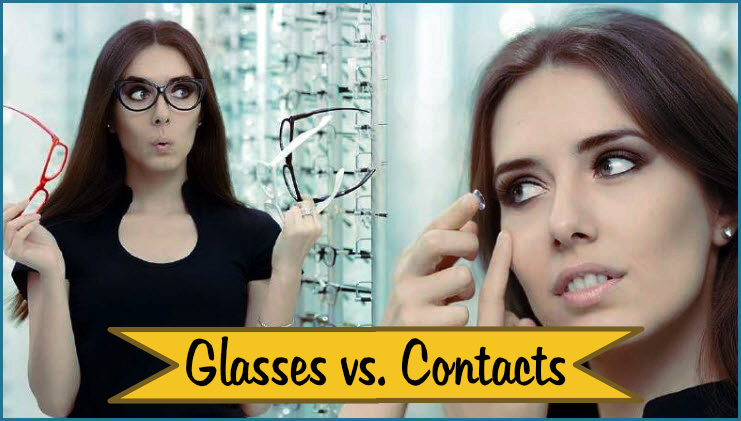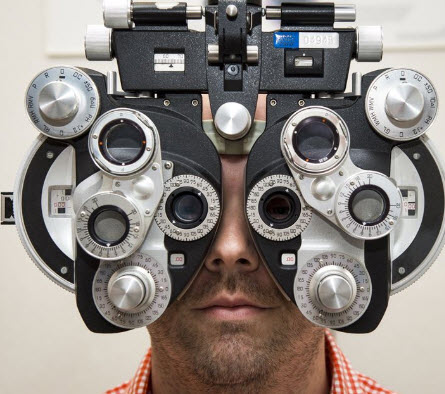Even though corrective procedures like Lasik surgery are becoming more popular and affordable, contact lenses and glasses are still the top choices for vision correction. They’re convenient, relatively easy to care for, and affordable for most people. Choosing between contacts vs. glasses isn’t always a choice. Most people who wear contact lenses also have a pair of glasses on hand for “emergencies” such as allergy attacks, lost contacts, or delayed shipping on contacts by mail. On the other hand, there are plenty of people who have glasses and don’t bother with contacts because they’re satisfied with just glasses.
 How do you choose between contacts vs. glasses? Here are some pros and cons of contacts, and some pros and cons of glasses that may help you decide.
How do you choose between contacts vs. glasses? Here are some pros and cons of contacts, and some pros and cons of glasses that may help you decide.
Pro Arguments for Contact Lenses
First of all, even though glasses come in some very attractive styles now, some people simply don’t like to have things on their face. Those who wear strong prescriptions may find glasses to be bulky and heavy, even with newer high-index lenses. And some people don’t like the way they look in glasses. With contacts, your face looks natural, and you have the option of a wide array of non-prescription sunglasses too. With the easy availability of contacts by mail, stocking up on contacts is very convenient.
Contact lenses are great for playing sports. Because you can now get one-day disposable contacts, it’s not even a hassle to wear contacts for sports where losing contacts is more likely (like swimming). People enjoy contacts for playing sports because there is generally no distortion as there can be with eyeglasses lenses, and because the field of view is larger with contacts, granting better peripheral vision, which can be a competitive edge in many sports.
 Contact lenses don’t fog up when you get out of an air-conditioned building and step into sweltering summer humidity. When it’s raining, you don’t have to worry about your contact lenses getting wet, while with glasses, you will have to clean the raindrops from the lenses. And despite it being a sit-com staple for decades, it’s not that easy for a contact lens to fall out. This was a big deal back when contact lenses cost several hundred dollars and were expected to last a year or two. But with disposable lenses, contacts by mail, and lower prices in general for contacts, losing a contact – which isn’t that likely – is not usually a big problem.
Contact lenses don’t fog up when you get out of an air-conditioned building and step into sweltering summer humidity. When it’s raining, you don’t have to worry about your contact lenses getting wet, while with glasses, you will have to clean the raindrops from the lenses. And despite it being a sit-com staple for decades, it’s not that easy for a contact lens to fall out. This was a big deal back when contact lenses cost several hundred dollars and were expected to last a year or two. But with disposable lenses, contacts by mail, and lower prices in general for contacts, losing a contact – which isn’t that likely – is not usually a big problem.
Perhaps one of the biggest reasons people choose contact lenses is that you can have so much fun with them. They come in a wide choice of colors that can turn even the darkest eyes another color. That means if you want to have green eyes to go with your green sweater on St. Patrick’s Day, you can do so. There are also some theatrical and special effect contact lenses that can be made with or without prescriptions. With colored and special effect contacts, vision correction can be made to coordinate with fashion and taste.
Pro Arguments for Glasses
Some people prefer the simplicity in eyeglasses and find it to be enough of an argument in itself to choose glasses over contact lenses. After all, if you forget to clean your glasses for a week, you’ll have smudged lenses, but if you forget to clean your contact lenses for a week, you could have an eye infection. Glasses can be put on and taken off easily while inserting contacts requires a mirror and good lighting for most people. Glasses can do a much better job of coping with astigmatism and complex prescriptions than contact lenses do. While there are bi-focal contacts, bi-focal glasses without lines are the “gold standard” for vision correction as people get older.
But glasses have their place in fashion too. A great pair of glasses can help a person look more sophisticated, more learned, and more competent (whether it’s true or not!). Some people have two or more pairs of glasses to go with different outfits. Some have a pair of “casual” glasses and a pair of “business dress” glasses, and some people get glasses in many colors to go with many different looks. A great pair of glasses can be like flattering jewelry for the face, and opticians are more than happy to help you pick out the best pair for your needs.
Cons of Contact Lenses
While contact lenses are well loved, there are some downsides to choosing them. Learning to insert and remove them can be difficult for some people, particularly younger people who have never tried them before. Regular cleaning is mandatory for all but daily disposable contacts. The consequences of improper lens care can be serious, such as eye infections. Unless contact lenses are specifically made so that they can be slept in, you can’t sleep in them. If you drop them, they’re hard to find, and you can’t open your eyes underwater if you’re wearing contacts without a sealed pair of goggles on top. Those with allergies may find their contacts uncomfortable during hay fever season, and cigarette smoke can be extra irritating to the eyes of contact lens wearers. And even though they cost much less than they used to, the cost of contact lenses and the solutions needed to keep them clean and safe can add up quickly, even with contacts by mail.
 Cons of Glasses
Cons of Glasses
Glasses can be bulky, particularly for those with really bad eyesight. The weight of even the lightest frames can hurt the ears and nose, and the pain is worse with bulky or heavy prescriptions. Glasses will fog up in many situations such as opening the dishwasher, stepping from an air-conditioned car into hot humid weather, or stirring the boiling pasta. If it is warm enough to cause you to sweat, few things are more annoying than glasses that persist in sliding down your nose. When it comes to the field of corrected vision, glasses don’t fix your side vision, and what peripheral vision you have can be distorted. Unlike contact lenses, glasses can break, leaving you in a pickle if you’re away from home and don’t have a backup pair. At least once a year, you’ll probably need to get your glasses readjusted to your face from everyday wear and the resulting stretching that commonly occurs. And glasses are not the best for sports because of the bulk, the problems with sweat, and the distorted peripheral vision.
In the debate of contacts vs. glasses, there are a lot of arguments for both sides. Many people who can afford it, have contact lenses that they wear primarily, and “backup” glasses for those occasions when they can’t or don’t want to wear contacts. For the most simplicity, glasses are the clear winners. But when it comes to cosmetic options and the freedom of having great peripheral and side vision, contacts prevail. Perhaps the one argument that may push things in the direction of glasses in the contacts vs. glasses situation is that if you have contact lenses, you need a pair of backup glasses, while if you have glasses, you don’t “need” a backup pair of contact lenses. Perhaps the best way to decide is to try on several styles of eyeglasses and several trial lenses until you find what suits you best.
